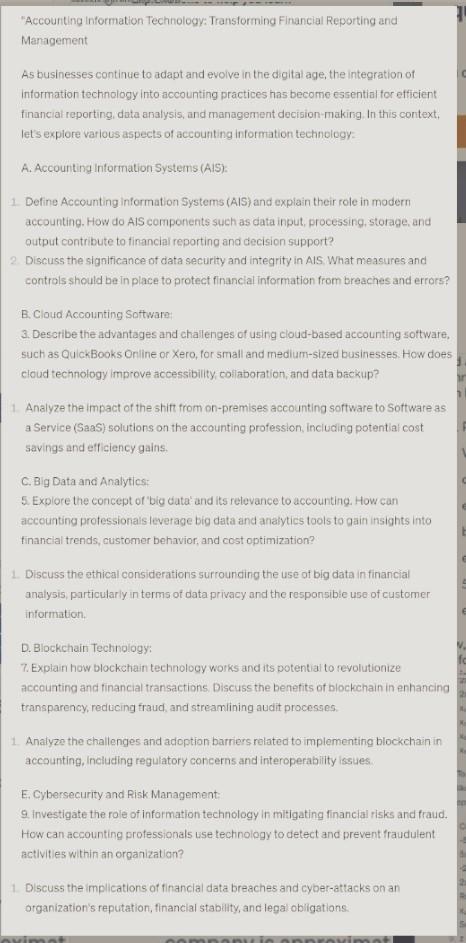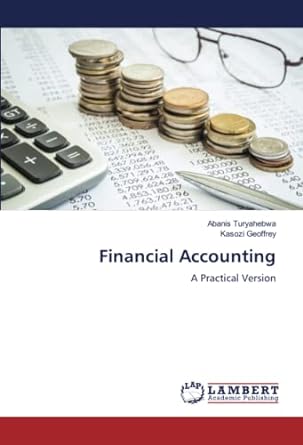Answered step by step
Verified Expert Solution
Question
1 Approved Answer
Accounting Information Technology: Transforming Financial Reporting and Management As businesses continue to adapt and evolve in the digital age, the integration of information technology into

"Accounting Information Technology: Transforming Financial Reporting and Management As businesses continue to adapt and evolve in the digital age, the integration of information technology into accounting practices has become essential for efficient financial reporting, data analysis, and management decision-making. In this context, let's explore various aspects of accounting information technology: A. Accounting intormation Systems (AIS): 1. Define Accounting information Systems (AIS) and explain their role in modern accounting. How do AlS components such as data input, processing, storage, and output contribute to financial reportino and decision support? 2. Discuss the significance of data security and integrity in AIS. What measures and controls should be in place to protect financial information from breaches and errors? B. Cloud Accounting Software: 3. Describe the advantages and challenges of using cloud-based accounting software, such as Qu ckBooks Online or Xero, for small and medium-sized businesses. How does cloud technology improve accessibility, collaboration, and data backup? 1 Analyze the impact of the shift from on-premises accounting software to Software as a Service (SaaS) solutions on the accounting profession, inciuding potentiai cost savings and efficiency gains. C. Big Data and Analytics: 5. Explore the concept of 'big ciata' and its relevance to accounting. How can accounting protessionals leverage big data and analytics tools to gain insights into financlal trends, customer behavior, and cost optimization? 1. Discuss the ethical considerations surrounding the use of big data in financial analysis, particularly in terms of data privacy and the responsible use of customer information. D. Blockchain Technology: 7. Explain how blockchain technology works and its potential to revolutionize accounting and financial transactions. Discuss the benefits of blockchain in enhancing transparency, reducing fraud, and streamlining audit processes. 1. Analyze the challenges and adoption barriers related to implementing blockchain in accounting, Including regulatory concerns and interoperability issues. E. Cybersecurity and Risk Management: 9. investigate the role of information technology in miligating financial risks and fraud. How can accounting professionals use technology to detect and prevent fraudulent activities within an organization? 1. Discuss the implications of financlal data breaches and cyber-attacks on an organization's reputation, financial stability, and legal obligations. "Accounting Information Technology: Transforming Financial Reporting and Management As businesses continue to adapt and evolve in the digital age, the integration of information technology into accounting practices has become essential for efficient financial reporting, data analysis, and management decision-making. In this context, let's explore various aspects of accounting information technology: A. Accounting intormation Systems (AIS): 1. Define Accounting information Systems (AIS) and explain their role in modern accounting. How do AlS components such as data input, processing, storage, and output contribute to financial reportino and decision support? 2. Discuss the significance of data security and integrity in AIS. What measures and controls should be in place to protect financial information from breaches and errors? B. Cloud Accounting Software: 3. Describe the advantages and challenges of using cloud-based accounting software, such as Qu ckBooks Online or Xero, for small and medium-sized businesses. How does cloud technology improve accessibility, collaboration, and data backup? 1 Analyze the impact of the shift from on-premises accounting software to Software as a Service (SaaS) solutions on the accounting profession, inciuding potentiai cost savings and efficiency gains. C. Big Data and Analytics: 5. Explore the concept of 'big ciata' and its relevance to accounting. How can accounting protessionals leverage big data and analytics tools to gain insights into financlal trends, customer behavior, and cost optimization? 1. Discuss the ethical considerations surrounding the use of big data in financial analysis, particularly in terms of data privacy and the responsible use of customer information. D. Blockchain Technology: 7. Explain how blockchain technology works and its potential to revolutionize accounting and financial transactions. Discuss the benefits of blockchain in enhancing transparency, reducing fraud, and streamlining audit processes. 1. Analyze the challenges and adoption barriers related to implementing blockchain in accounting, Including regulatory concerns and interoperability issues. E. Cybersecurity and Risk Management: 9. investigate the role of information technology in miligating financial risks and fraud. How can accounting professionals use technology to detect and prevent fraudulent activities within an organization? 1. Discuss the implications of financlal data breaches and cyber-attacks on an organization's reputation, financial stability, and legal obligations
Step by Step Solution
There are 3 Steps involved in it
Step: 1

Get Instant Access to Expert-Tailored Solutions
See step-by-step solutions with expert insights and AI powered tools for academic success
Step: 2

Step: 3

Ace Your Homework with AI
Get the answers you need in no time with our AI-driven, step-by-step assistance
Get Started


